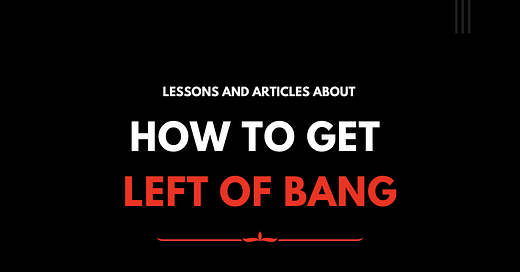From Science to the Streets – When Your Confidence Is The Problem
After having a conversation with another Combat Hunter instructor about the how confident students should be making decisions immediately following our course, I wanted to find some more information about people’s confidence in reading nonverbal cues. We want our students to be confident after the course, because without confidence in the accuracy of their observations, they may not take action to prevent a crime or an attack from occurring. But, at the same time, we know that confidence is certainly not an indicator of capability when it comes to any skill, and we have all seen those people who are so overconfident in their assessments that no one takes them seriously.
So we want to instill a level of humble confidence in your students, humble enough to keep learning and being realistic about your capabilities, but confident enough to take action when you see something. You should also have confidence communicating why you did what you did. Think about a police officer who has to take the stand to discuss specifically what they observed before they arrested the person, or a Marine whose actions have been called into question as to why they chose to shoot a suspected insurgent. Your ability to confidently recall what you observed and why that information is valid as an indicator of threats can greatly influence the credibility of your actions.
I found an article posted in the Journal of Nonverbal Behavior that discusses this exact dynamic (information on the article is posted below) and a topic that the authors bring up that requires some consideration:
“In having to reflect on their confidence, participants’ judgments are likely to become less automatic and, consequently, the confidence implied in such automaticity may be disrupted.”
Imagine learning to drive a car where you never had to use your turn signal, ever. For the first few years you never once signaled your intentions to change lanes or turn a corner. One day you get a traffic ticket for not using your turn signal and now want to make it a habit of your driving. How easy is it for you to change your behavior and incorporate communicating your intentions to people through your turn signal? At first, it is going to be extremely difficult, because the process of driving has become automatic and using the turn signal is not part of that process. It will require constant conscious effort to relearn how to drive, and until you repetitively do it to the point where you can incorporate it into every day driving without extra thought.
The same concept applies to learning to profile. If you have limited profiling experience, you can develop your ability to use these skills while simultaneously developing your ability to communicate what you are observing using the profiling domains. This will help you make confident decisions and your automaticity in making determinations based off of non-verbal cues will never be set off course.
If you are a 20-year police officer and have been making these observations without ever having to communicate why you arrested the person, it is going to take some time to relearn how to look at people and become intuitively capable of observing and communicating seamlessly. Is it possible? Absolutely. Because profiling is designed to recognize threats and ultimately save your life, we do not want you to ever hesitate to make a decision. But, as I said, it will take conscious effort in the short term to make it a habit.
One goal of behavioral analysis is to help bring more Marines home alive and have more police officers return home safely after their shift. We want you to take action immediately upon recognizing a threat, and having to communicate what you saw should not disrupt that automatic response that the authors talk about above. This is why the communication of the domains is such an important and integral part of the course. If you learn to observe and communicate simultaneously, you can take immediate action without questioning yourself. This confidence will also be maintained when you justify your actions and have to explain why you took someone’s life, arrested them, or made the decision to contact them.
If you have access to research databases, the article can be found by looking for:
“Another Look At Accuracy And Confidence In Social Judgments” by Miles L. Patterson, Jeffrey L. Foster and Craig D. Bellmer. Journal of Nonverbal Behavior 25(3), Fall 2001, Human Sciences Press, Inc.



